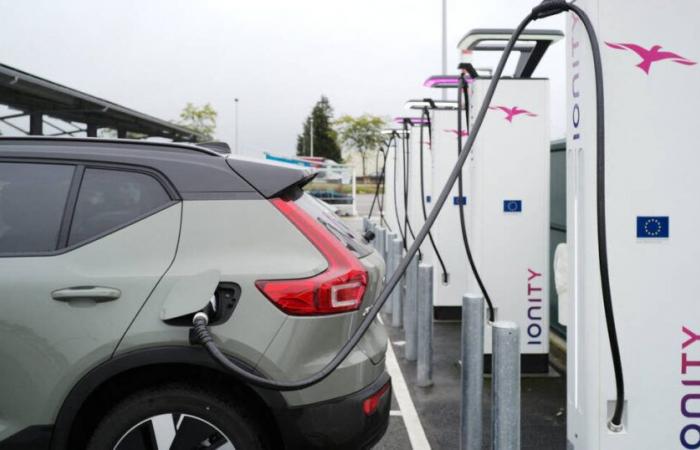Concerning the necessary transition of vehicles, the figures for 2024 can be read in two ways. According to the Association of European Automobile Manufacturers (ACEA), sales of electric cars have fallen sharply (-5.9%) compared to 2023. All in a market, all engines combined, up +0, 8% to 10.6 million units – far from the 15.3 million in 2019. But, while sales of electric cars grew by 25% worldwide in 2024, mainly thanks in China, the matter is more complex. Over one year, there is a drop of 91,000 100% electric cars in the EU. But the drop in Germany alone is 144,000 units. We can therefore summarize the situation as follows: without the Berlin disaster, sales of electric cars would, on average, have increased by 5.2% in the EU in 2024.
While 2024 was anticipated as a possible pivotal year, this engine was progressing on a curve, if not exponential, at least in continuous progression. But with a 13.6% market share, the collapse across the Rhine ultimately leads to a drop of 1 point over one year. And if gasoline cars remain in the lead on the Old Continent (33.3%, -2 points), it is the non-rechargeable hybrid which continues to progress (30.9%, + 5.1 over one year) . So much so that we don't see how this engine can escape first place in 2025. The twilight of diesel is confirmed, however: with 11.9% sales share last year, it drops by 1.7 point compared to 2023.
Stellantis collapses, Toyota shines
On the manufacturer side, the situation is more mixed than last year. Still in the crisis, which notably led to the resignation of its boss Carlos Tavares at the beginning of December, Stellantis (Peugeot, Opel, Citroën, Fiat, Jeep, etc.) confirms that its problems are not confined to North America, with a fall 7.2% of its sales between 2024 and 2023, and even 20.8% for Fiat. You have to imagine the scale of the disaster: the group sold 1.74 million cars last year. In 2018, 2.5 million were sold. Another manufacturer in crisis, the Volkswagen group, still first in sales in Europe, is limiting the damage (+ 3.2% over one year) – despite the heavy fall of Audi (-9.4%) -, while like the Renault group (+ 1.9%), which retains its third position overall. The Hyundai group, on the other hand, is the other big loser, mainly due to the collapse of the Kia brand (-10.1%), while sales of this brand throughout the world have nevertheless increased very slightly by 0, 1%.
-Dynamics in terms of engines are also reflected in the sales of manufacturers who have specialized. King of the non-rechargeable hybrid, the Toyota brand is the one which shows the best progress (+ 16.2%) and the group (which it forms with Lexus) even steals 4th place from Hyundai. The pioneer of 100% electric, Tesla is suffering, for its part, the decline of this technology (-13.1%) with here also the impact of the German market, since the decline across the Rhine is equivalent to two thirds of that on all the continent.
How to restart the electric machine? While the radical end of aid in Germany, Europe's largest automobile market, has shown its harmful nature for the transition, France, the second market, is taking the same path, only slightly more gently (drastic reduction in the ecological bonus, end scrappage bonus, limitation of social leasing, etc.). However, the Berlin decision showed that“prime the pump”, as Bruno Le Maire and other ministers liked to point out, and trusting the private sector to offer cheap electric cars is not enough. A rare brightening in the picture, the AlixPartners firm calculated in a study published on January 14 that the difference in costs in natural resources between a thermal car and an electric car running with a lithium iron phosphate (LFP) technology battery is for the first time less than 1,000 euros in Europe. Enough to hope for a flash of lucidity from European manufacturers, much more focused on margins than on the expectations of all consumers. And obviously the planet.






